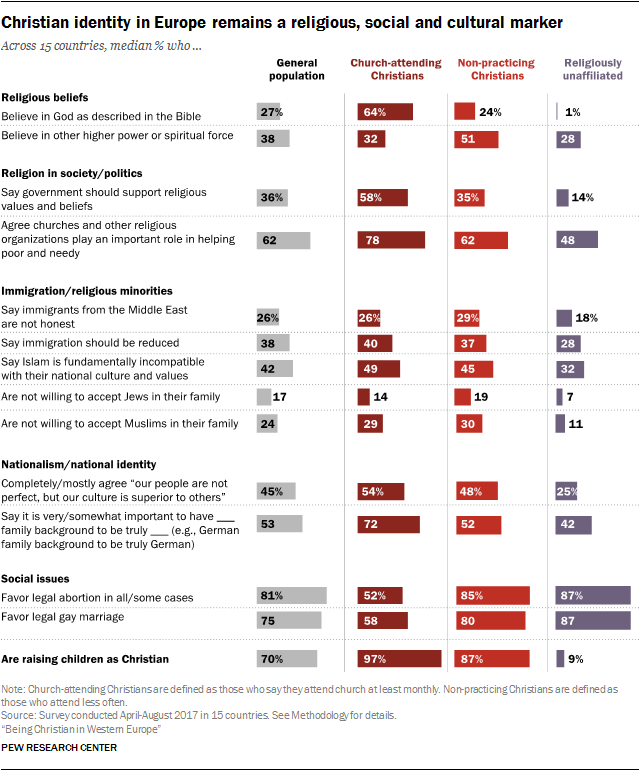Pew Research has released a new survey from western Europe, contrasting the views of practicing Christians, non-practicing Christians and religiously unaffiliated (“nones”) when it comes to both social and spiritual issues. The survey was based on 24,000 phone interviews in 12 languages with “randomly selected adults” in 15 countries. Non-practicing Christians (those who identify as Christians but attend only a few religious services a year) were the majority in most countries surveyed. From the report:
Christian identity remains a meaningful marker in Western Europe, even among those who seldom go to church. It is not just a “nominal” identity devoid of practical importance. On the contrary, the religious, political and cultural views of non-practicing Christians often differ from those of church-attending Christians and religiously unaffiliated adults. For example:
- Although many non-practicing Christians say they do not believe in God “as described in the Bible,” they do tend to believe in some other higher power or spiritual force. By contrast, most church-attending Christians say they believe in the biblical depiction of God. And a clear majority of religiously unaffiliated adults do not believe in any type of higher power or spiritual force in the universe.
- Non-practicing Christians tend to express more positive than negative views toward churches and religious organizations, saying they serve society by helping the poor and bringing communities together. Their attitudes toward religious institutions are not quite as favorable as those of church-attending Christians, but they are more likely than religiously unaffiliated Europeans to say churches and other religious organizations contribute positively to society.
- Christian identity in Western Europe is associated with higher levels of negative sentiment toward immigrants and religious minorities. On balance, self-identified Christians – whether they attend church or not – are more likely than religiously unaffiliated people to express negative views of immigrants, as well as of Muslims and Jews.
- Non-practicing Christians are less likely than church-attending Christians to express nationalist views. Still, they are more likely than “nones” to say that their culture is superior to others and that it is necessary to have the country’s ancestry to share the national identity (e.g., one must have Spanish family background to be truly Spanish).
- The vast majority of non-practicing Christians, like the vast majority of the unaffiliated in Western Europe, favor legal abortion and same-sex marriage. Church-attending Christians are more conservative on these issues, though even among churchgoing Christians, there is substantial support – and in several countries, majority support – for legal abortion and same-sex marriage.
To read the survey’s results, go to the link in the first paragraph above; the article details perspectives on the role of religion in government, the care of the poor and the emphasis on nationalism, as well as discussing the impact of Muslim immigration on Christian identity.
Photo: St. Mary Aldermary, London, U.K.; photo by Cara Modisett.


